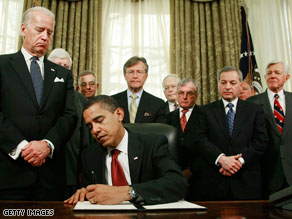WASHINGTON (CNN) -- Promising to return America to the "moral high ground" in the war on terror, President Barack Obama issued three executive orders Thursday to demonstrate a clean break from the Bush administration -- including one requiring that the Guantanamo Bay detention facility be closed within a year.

President Obama signs the order requiring that the Guantanamo Bay facility be closed within a year.
During a signing ceremony at the White House, Obama reaffirmed his inaugural pledge that the United States does not have "to continue with a false choice between our safety and our ideals."
The president said he was issuing the order to close the Guantanamo detention facility in order to "restore the standards of due process and the core constitutional values that have made this country great even in the midst of war, even in dealing with terrorism."
A second executive order formally bans torture by requiring that the Army field manual be used as the guide for terror interrogations. That essentially ends the Bush administration's CIA program of enhanced interrogation methods.
"We believe that the Army field manual reflects the best judgment of our military, that we can abide by a rule that says we don't torture, but that we can still effectively obtain the intelligence that we need," Obama said.  Watch Obama sign the orders » Watch Obama sign the orders »
"This is me following through ... on an understanding that dates back to our founding fathers, that we are willing to observe core standards of conduct not just when it's easy but also when it's hard."
A third executive order establishes an interagency task force to lead a systematic review of detention policies and procedures and a review of all individual cases.
The task force, Obama stated, will also "provide me with information in terms of how we are able to deal (with) the disposition of some of the detainees that may be currently in Guantanamo that we cannot transfer to other countries, who could pose a serious danger to the United States."  Watch Obama administration explain why they are closing the prison » Watch Obama administration explain why they are closing the prison »
The president also signed a memorandum delaying the trial of Ali Saleh Kahlah al-Marri, a legal U.S. resident who has been contesting his detention for more than five years as an enemy combatant in a military brig without the government bringing any charges against him.
Al-Marri's case is currently before the U.S. Supreme Court.
Al-Marri "is clearly a dangerous individual," Obamasaid. "We have asked for a delay in going before the Supreme Court to properly review the evidence against him."
During the second Bush term, the detention facility at GuantanamoBay became a lightning rod for critics who charged the Bush administration with torturing terror detainees. President George W. Bush and other senior officials repeatedly denied that the U.S. government had used torture to extract intelligence from terror suspects.  Watch experts debate the Gitmo dilemma » Watch experts debate the Gitmo dilemma »
The decision to close the detention facility received immediate backing from Obama's general election opponent, Arizona GOP Sen. John McCain.
McCain, in a joint statement released with South Carolina GOP Sen. Lindsey Graham, said he supported Obama's decision to "reaffirm America's adherence to the Geneva Conventions, and begin a process that will, we hope, lead to the resolution of all cases of Guantanamo detainees."
A number of congressional Republicans, however, split with their former party standard-bearer and criticized Obama's decision.
"We cannot risk going back to the politically correct national security policies that left us vulnerable in the lead-up to 9/11," Michigan GOP Rep. Peter Hoekstra, a member of the House Intelligence Committee, said in a written statement. "Without a clear plan for the detention and interrogation of captured terrorists and combatants, we are unnecessarily risking the safety of our nation."
Obama's move also highlights a fierce struggle over where the prison's detainees will go next.
"The key question is where do you put these terrorists," House Minority Leader John Boehner, R-Ohio, said in a statement issued Wednesday. "Do you bring them inside our borders? Do you release them back into the battlefield?"
Rep. Bill Young, R-Florida, said he has "quite a bit of anxiety" about the possibility of transferring detainees to United States facilities.
"Number one, they're dangerous," Young said. "Secondly, once they become present in the United States, what is their legal status? What is their constitutional status? I worry about that, because I don't want them to have the same constitutional rights that you and I have. They're our enemy."  Watch what may happen to Gitmo's inmates » Watch what may happen to Gitmo's inmates »
Young said he asked White House Counsel Greg Craig what the government plans to do with two recently built facilities at the Guantanamo base, which he said cost half a billion dollars. He said Craig had not thought about what to do with them but pledged to discuss the issue further. iReport.com: Closing Gitmo a 'risk'
Young said he suggested reopening Alcatraz, the closed federal prison on an island in California's San Francisco Bay -- in current Democratic House Speaker Nancy Pelosi's district.
"Put them in Alcatraz where supposedly they can't escape from," Young said. But he added that the suggestion "didn't go over well." |